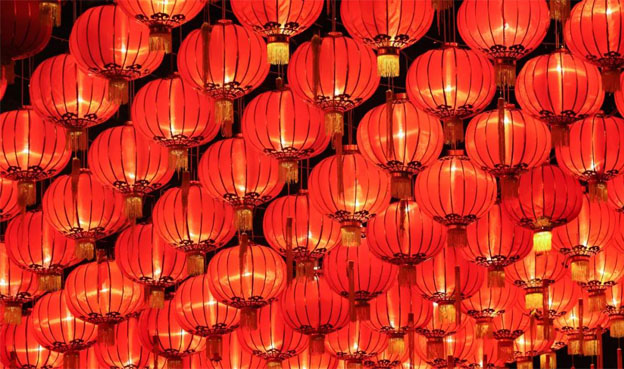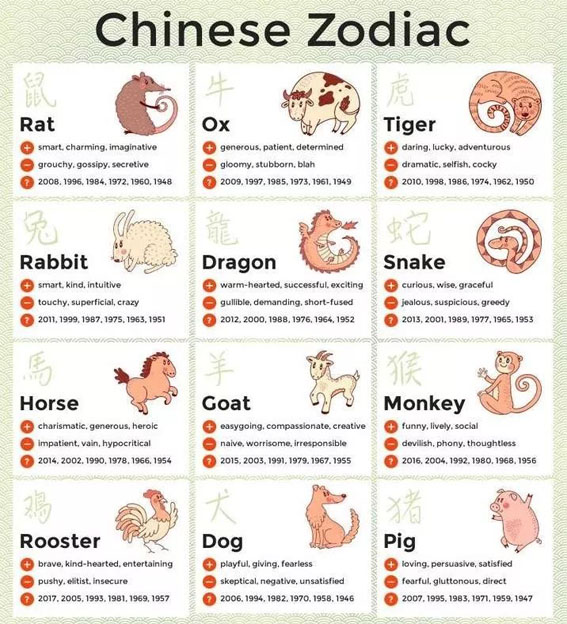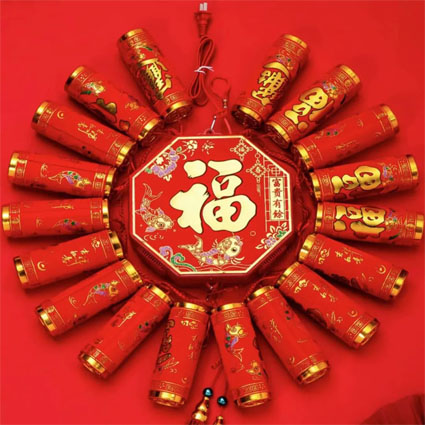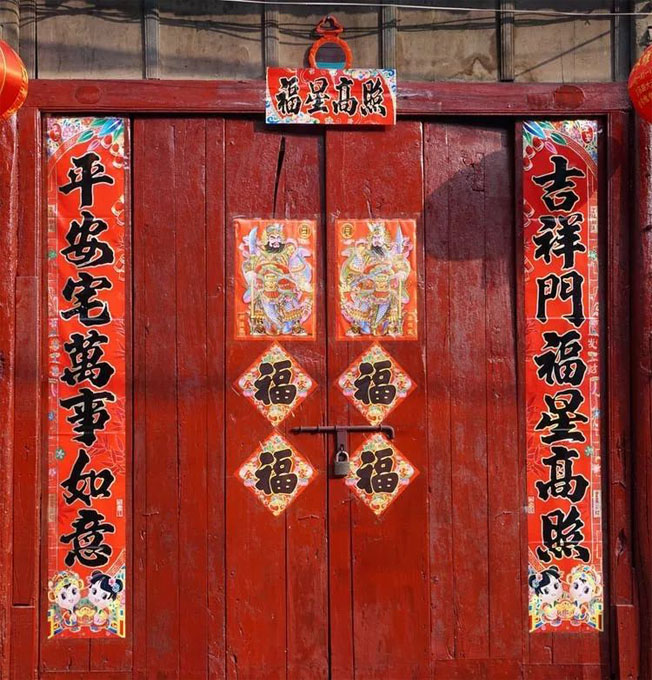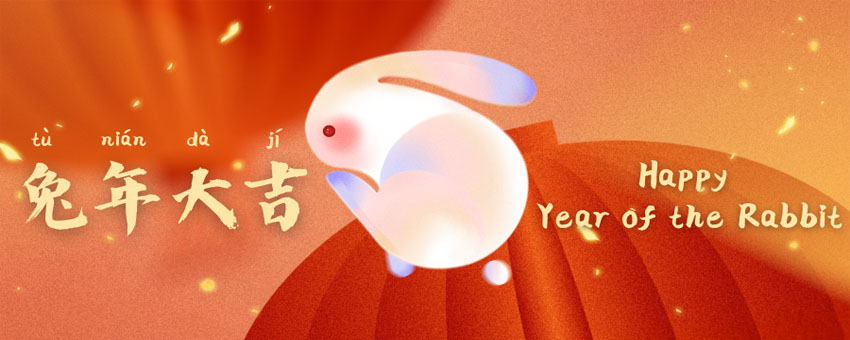
Chinese people don't have a particular interest in December 31st / January 1st. What the whole country is excited about is the Chinese New Year! Chinese people call the whole celebration - 过年guònián. The importance of this celebration can be compared with the importance of Christmas in most western cultures.
The general duration of "过年" is 3 weeks, including the preceding preparing week, the New Year holiday week (the national public holiday of this year: Jan 21st to Jan 27th) and the third week ending up with the Lantern Festival (Feb 5th). People will plan their holidays accordingly from 1-3 weeks.
In this article, we would like to give you an all-round guide to understand the upcoming 兔年/Tù nián (Year of the Rabbit). As we summarize below, we believe there are 5 facts that you can't miss about Chinese New Year. Let's check them out one by one!
You must know that most Chinese national holidays are set according to the lunar calendar. Chinese people didn't use the solar calendar (Western calendar) until 1912. But why "Rabbit" this year?What do the animals stand for each year?
The Chinese Zodiac is a classification scheme that assigns an animal and its reputed attributes to each year in a repeating 12-year cycle. The 12-year cycle is an approximation based on the 11.85-year orbital period of Jupiter.The 12 animals and 12-year cycle start from the rat, followed by ox, tiger, rabbit, dragon, snake, horse, goat/sheep, monkey, rooster, dog and pig. That's why Chinese people call 12 years "one round/cycle"- "一轮yìlún"."12 Chinese Zodiacs", which one is yours?The coming new year, in the name of the Rabbit (兔/tù), is the fourth year of the 12-year cycle. You might wonder why the rabbit is chosen as one of the Chinese Zodiacs?Why not other cute furry animals like cat? And why are the animals ranked in this pattern?
Here is one of the famous stories that explains why rabbit has the privilege of being included in the Chinese Zodiacs and how the 12 animals are ranked
The rabbit is a symbol of kindness, grace, loyalty and beauty. People born in years of the Rabbit tend to be particularly gentle, modest and courteous, but at the same time dashing, resourceful, pure and responsible. There are many celebrities were born in the years of the Rabbit, here I listed a few: One of the most important routines for Chinese people in the New Year's Eve, is the dinner - 年夜饭niányèfàn. This meal is comparable to Thanksgiving dinner in the U.S. and relatively similar to a traditional Christmas dinner.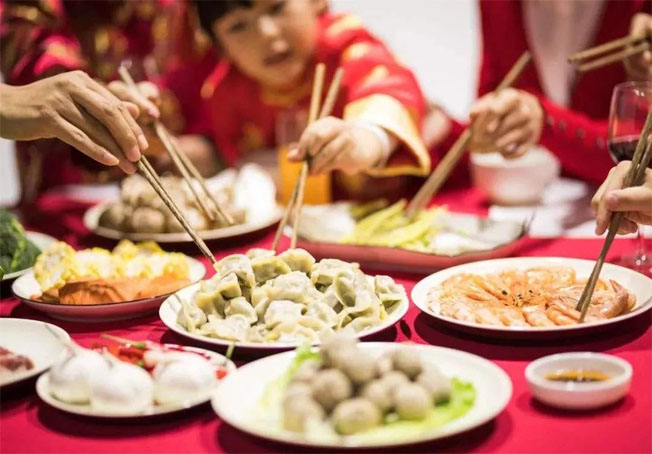
Dumplings play a very important role on the table of Chinese New Year Eve's dinner especially in the north
Chinese people try very hard to "save" luck for the whole year during CNY celebration. So all the food on the dinner table can symbolize fortune and luck.Dumplings/饺子/jiǎozi, symbolize wealth because their shape resembles ancient Chinese money. Sometimes people will hide a coin inside the filling while making the dumplings, and whoever bit that coin later will be the most lucky person in the family!Rice cake/年糕/niángāo, equals progress because "niángāo" has a homophonous meaning of "increasingly prosperous year in year out".Fish/鱼/yú, means abundance because "yú" sounds the same as "surplus".Traditionally, people stay up for the whole night after the feast to welcome the New Year. Lots of people will choose to go out to set off firecrackers in midnight. You probably won't hear firecrackers at midnight in Shanghai now, as the government in the past few years has forbidden firecrackers for a variety of safety reasons.Some people buy electronic firecrackers to add some CNY vibe to the house
However, if you go to other smaller cities to celebrate the New Year, you will see the whole city is lit up by tons of the firecrackers and fireworks to scare away evil spirits for the New Year.The Spring Festival Gala
of China Central Television
If you don't feel like going out on New Year's eve, watching the CCTV New Year's Gala (春晚chūnwǎn) is also a great option.
Beginning in 1982, CCTV held this Gala to accompany Chinese people who practice the tradition of staying up late "守岁shǒusuì". This tradition of going to bed late on New Year's Eve, or staying awake the whole night is thought to add on to parents' longevity.The CCTV New Year's Gala is broadcast in China four hours before the start of the New Year and lasts until early morning the next day. Watching it has gradually become a tradition in China.CCTV Spring Festival Gala of 2022, Year of the TigerToday, after 41 years, even though the TV industry has been strongly impacted by Internet, this Gala remains a special element in Chinese people's cultural life. The gala this year will gather hundreds of the most popular Chinese celebrities, and this has already caused a bustle on the Internet.
Greetings
during the CNY holidayChinese people love lucky words during CNY holidays and they hate to hear some negative things to break the whole year's fortune.
There're some general words you can use every year, such as:
过年好!
Guò nián hǎo!
Happy Chinese New Year celebration!
新春快乐/吉祥!
Xīnchūn kuàilè/jíxiáng!
Wish you a happy/auspicious Spring Festival!
恭喜发财!
Gōngxǐ fācái!
May you be happy and prosperous!
As every Chinese New Year has a zodiac, so Chinese people will make some special lines related to the animal. This year is 兔年Tùnián (Year of the Rabbit), so you can also say:
兔年大吉!
Tùnián dà jí!
Wish you a greatly auspicious Year of the Rabbit!
And there are some cute Year of the Rabbit puns too:
前途(兔)似锦
qián tú (tù) sì jǐn
A bright future in the Year of the Rabbit
大展宏图(兔)
dà zhǎn hóng tú (tù)
Grand plans in the Year of the Rabbit
兔 Be No. 1
Tù be No. 1
To be No. 1
We are supposed to finish this article with 4 points, but you know, we hate 4 (Homophonic with death - 死sǐ in Chinese), especially during the festival celebration. So here's the last but not the least point:
The CNY decorations
Spring Festival Scrolls 春联 Chūnlián
春联Chūnlián are composed of a pair of poetry lines vertically pasted on both sides of the front door and a four-character horizontal scroll affixed above the doorframe. The couplets express Chinese people's delight in the festival and wishes for a better life in the coming year.
The red diamond-shaped
FU福 character
福 (Fú, blessings, happiness) is played in Chinese homes. This sign is usually seen hanging upside down, since the Chinese word 倒 (dào, upside-down), is a homophone with 到 (dào, arrive) in Chinese. Therefore, it symbolizes the arrival of happiness and prosperity.
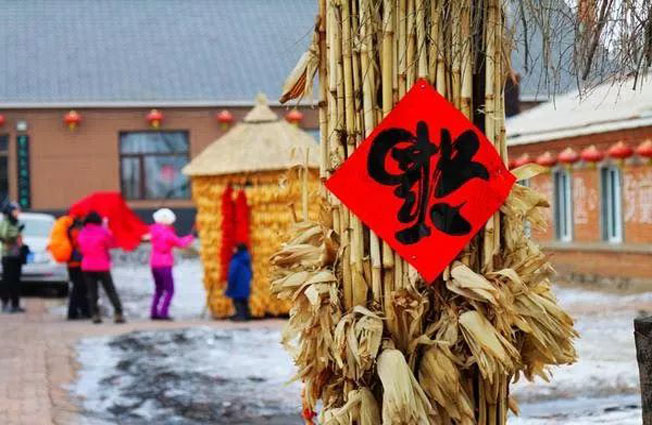
I hope you can enjoy the Chinese New Year celebration more with these explanations! It's definitely an excellent opportunity to understand and experience Chinese culture during the Spring Festival. We wish you all have fun in the next few weeks!
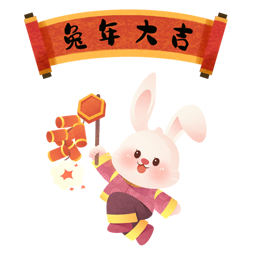
春节快乐!兔年大吉!
Chūnjié kuàilè! Tùnián dàjí!

